Understanding AI Agents in Healthcare: Transforming Patient Care and Operational Efficiency
Learn how AI agents in the healthcare sector are enabling revolutionary applications to enhance patient care and share the daily operational load.
6/30/2025
artificial intelligence
13 mins
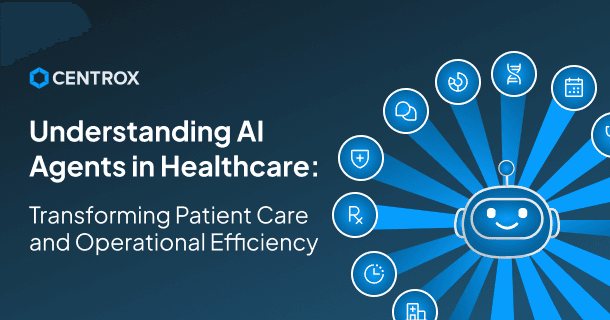
We have lately been hearing a lot about AI agents, as these are proving themselves as more efficient and reliable innovations, ultimately improving decision-making. The implementation of AI agents in healthcare applications can be very revolutionary, as it can provide more precise, personalized, reliable, and updated medical assistance for your medical queries.
With a growing population, we can anticipate rising demands for quality healthcare services. The traditional methodologies are not only inefficient but also insufficient to provide helpful, timely support to patients around the globe, becoming a major reason for concern for everyone. Here, the integration of an AI agent-driven solution in the healthcare industry can prove itself as a single reliable solution for all these issues.
Through our article, we will discuss what AI agents are, how AI agents can transform the healthcare space, and some particular applications it has, along with mentioning the benefits and limitations, so that you can plan ahead of these aspects, to make more futuristic applications.
Understanding AI Agents
AI agents can be considered as computer programs that hold the ability to perceive the environment, draw analogies, make decisions, and take appropriate actions. They utilize a combination of machine learning, natural language processing, and computer vision technologies that allow it to evaluate input, process it, and eventually generate intelligent responses.
Similar to how humans process, these AI agents work on a sense-think-act cycle. In this cycle, the data is gathered for sensing purposes, which is then processed through an algorithm that reasons and thinks by utilizing the data, and finally, the action is executed over the thought-based decisions in the form of sending emails, analyzing data, or chatting with users.
Where some agents can work independently, some agents interact with humans or other agents to get their respective responsibilities done, it completely depends upon the requirements of the task. But from these AI agents, we are able to have a smart digital assistant that can share the workload by automating and streamlining complex tasks.
How Can AI Agents Transform the Healthcare Sector?
Since the introduction of AI agents, they have made a significant contribution across various domains and have eventually improved workflows. The inclusion of these smart AI agents has enabled the automation of routine tasks, enhanced diagnostic accuracy, and extended personalized care to everyone around the world.
By having access to updated data and constantly learning, these intelligent agents can even make well-reasoned decisions for healthcare needs. This indicates that the capability of AI agents today is not just limited to handling routine tasks like managing patient records, scheduling appointments, and monitoring vital signs in real-time, rather it can also make decisions and take actions for critical tasks like analyzing medical images, lab reports, and patient history to assist doctors in identifying diseases faster and more accurately.
Dr. Fei-Fei Li (Co-Director of Stanford’s Human-Centered AI Institute) highlights the importance and role of AI agents, saying:
“AI agents are not just tools but collaborators in care — capable of monitoring patients, predicting health risks, and supporting clinicians in making better decisions.”
Thus, AI agents are not limited to becoming a helpful tool, rather, they are proving themselves as an impactful assistant, which can be transformative for the healthcare sector by making the operations more efficient, accessible, and proactive, ultimately improving patient outcomes and reducing system strain.
Application of AI Agents in the Healthcare Domain
The integration of AI agents in the healthcare domain can be revolutionary in transforming traditional patient care methodologies while also enhancing operational efficiency. Below, we have mentioned some areas, particularly in the healthcare domain, where the implementation of AI agents can be beneficial:
Medical Diagnosis
- Introduction: Traditional medical diagnosis approaches are time and effort-consuming. It requires a lot of resources for performing responsibilities like diagnosing diseases, analyzing patient data, images, and test results. An AI agent here can work as a single solution for handling these tasks.
- How It Works: AI agents implemented for carrying out this responsibility use machine learning to process medical imaging (like X-rays or MRIs) and electronic health records (EHRs), it identify the patterns or anomalies and suggest potential diagnoses.
- Impact: Eventually, AI agents implemented for medical diagnosis purposes help in boosting diagnostic accuracy, make disease detection more convenient, and reduce the workload on radiologists and clinicians.
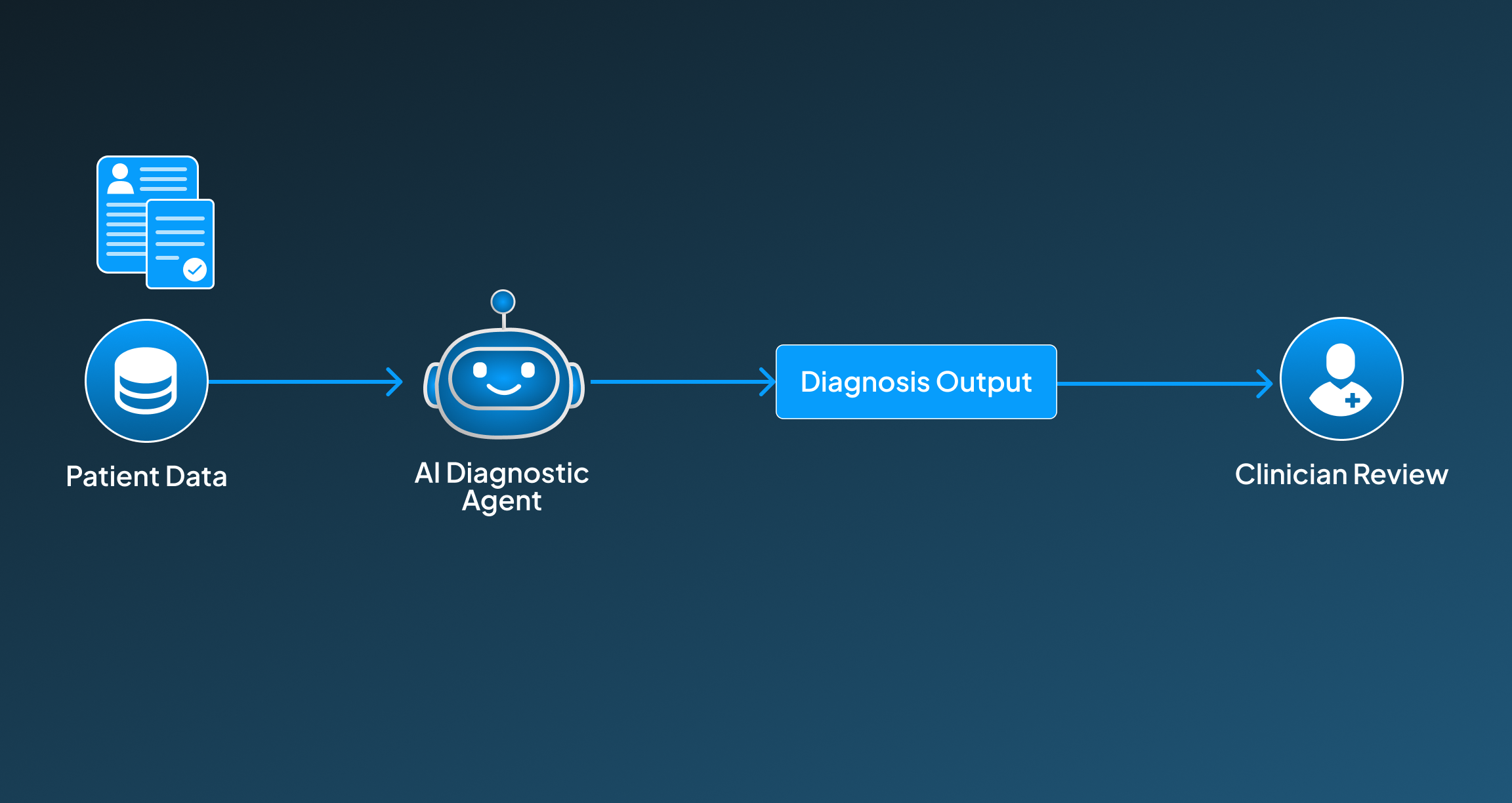
Drug Discovery and Development
- Introduction: Drug discovery and development require rigorous research, analysis, and testing in order to provide a safe and impactful drug for a specific disease. AI agents can accelerate this process by identifying promising compounds and predicting helpful effects.
- How It Works: AI agents work here by analyzing the complex chemical structures, simulating molecular interactions, and forecasting potential side effects using deep learning and generative models.
- Impact: By introducing this application, AI agents help in reducing the time to provide new drugs to market, minimizing the cost spent on research and development, and increasing the likelihood of finding breakthrough treatments.
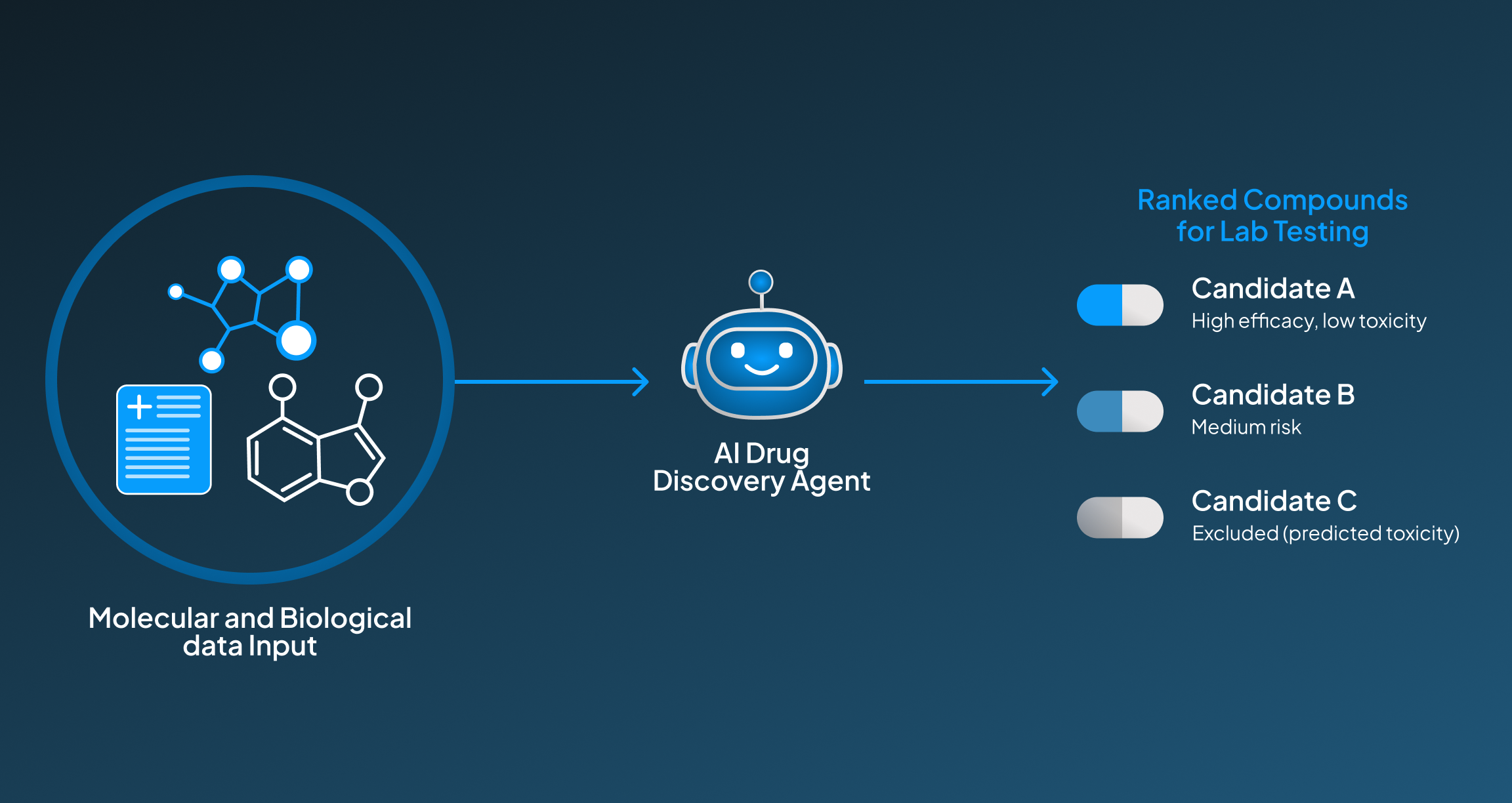
Personalized Treatment Planning
- Introduction: Making a personalized treatment plan for patients can contribute to improving their overall health. An AI agent implemented to cause can support precision medicine by creating customized treatment plans using a patient's genetic makeup, lifestyle, and history.
- How It Works: AI Agents operates here by analyzing large datasets about genomics, electronic health records, and real-world outcomes, and accordingly suggests the most effective therapies.
- Impact: An AI agent-driven application of this nature ultimately improves treatment success, while minimizing trial and error prescribing, and promotes personalized treatment plans to ensure a more enhanced health.
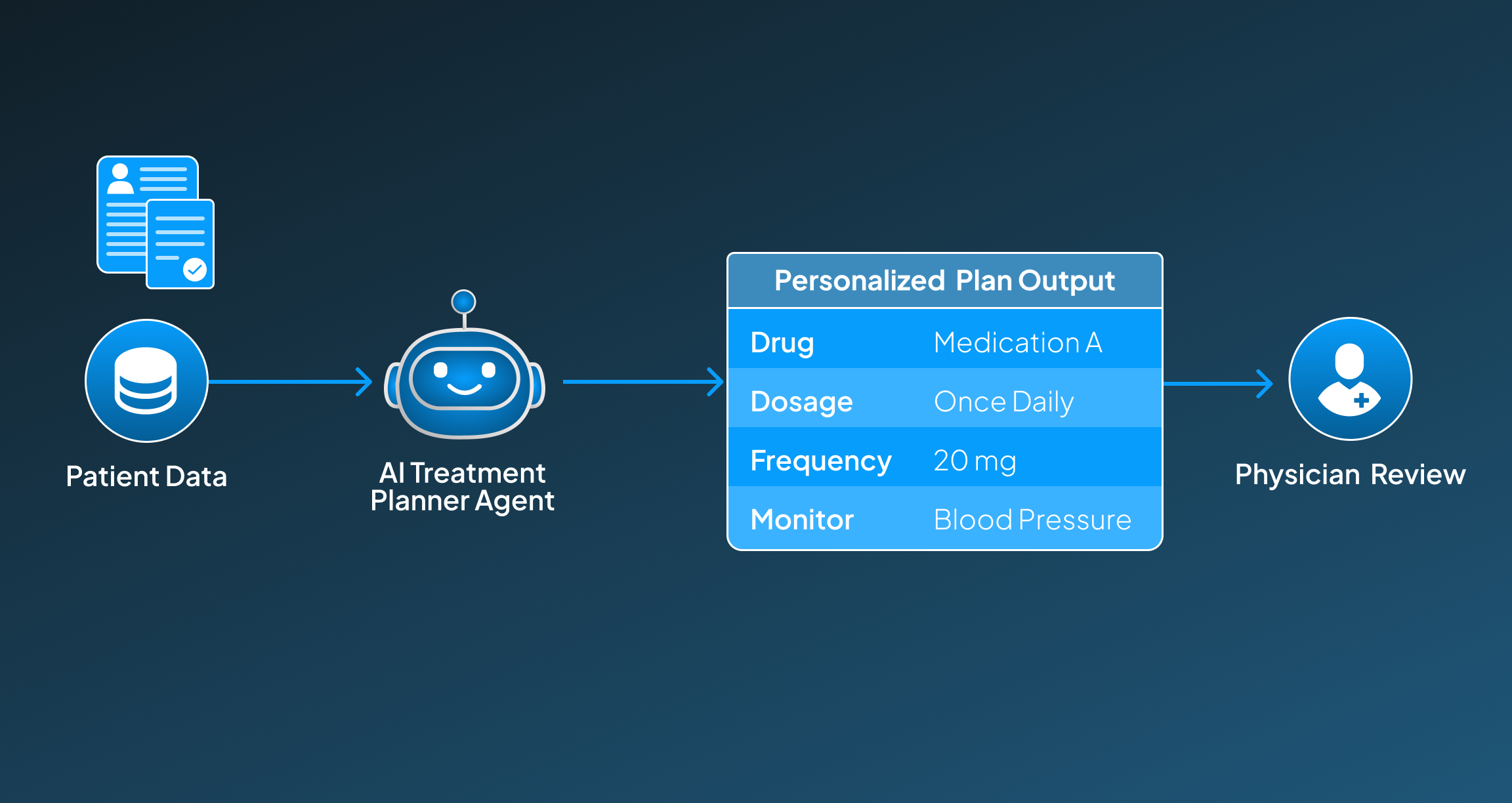
Patient Monitoring and Remote Care
- Introduction: Some patients might not have direct access to the top quality healthcare services because of their rural areas, which might result lead to any mishap or life loss. AI agents can help monitor patients in real time remotely, especially those with chronic conditions or recovering at home, helping them receive care from the comfort of their homes.
- How It Works: These AI agents function by connecting to wearables and medical devices to track vitals like blood pressure, glucose, and oxygen levels. This also provides when values deviate from the normal level.
- Impact: AI agents integrated for this patient monitoring application enable early interventions, which reduce emergency visits, provide 24/7 supervision, even for remote setup, helping in chronic disease management.
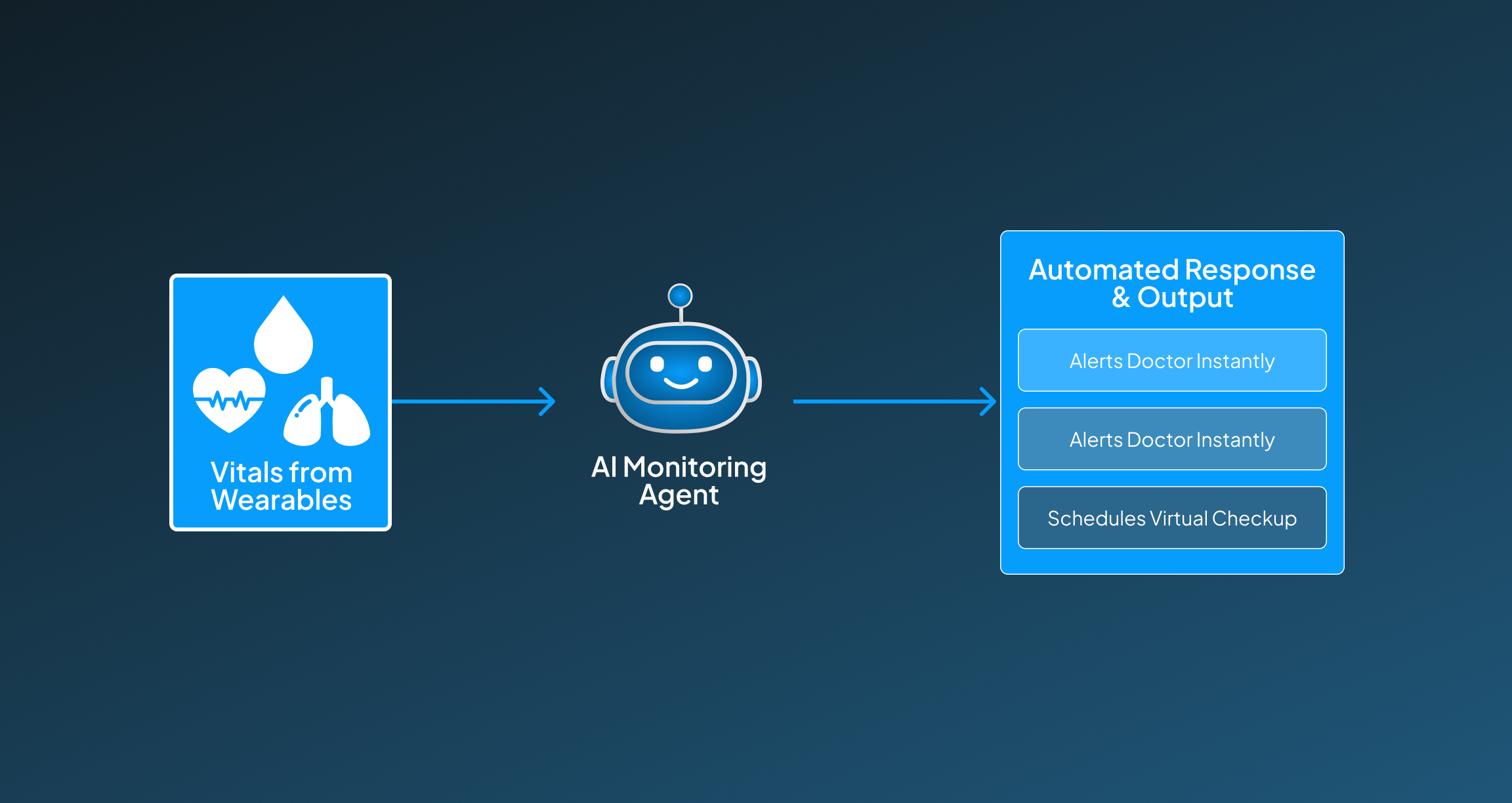
Administrative Workflow Automation
- Introduction: Hospitals or clinics deal with thousands of patients every day, and they have to manage the administration for them. Managing administrative tasks manually can be time-consuming. Here, the involvement of AI agents eliminates bottlenecks in healthcare operations by automating repetitive administrative tasks.
- How It Works: AI Agents work by handling appointment scheduling, claims processing, and form submissions using rule-based systems and natural language processing, eventually automating the daily repetitive tasks.
- Impact: This AI agent-powered application helps in reducing clerical errors, speeds up back office operations, and allows human staff to focus on more critical tasks where their involvement is necessary.
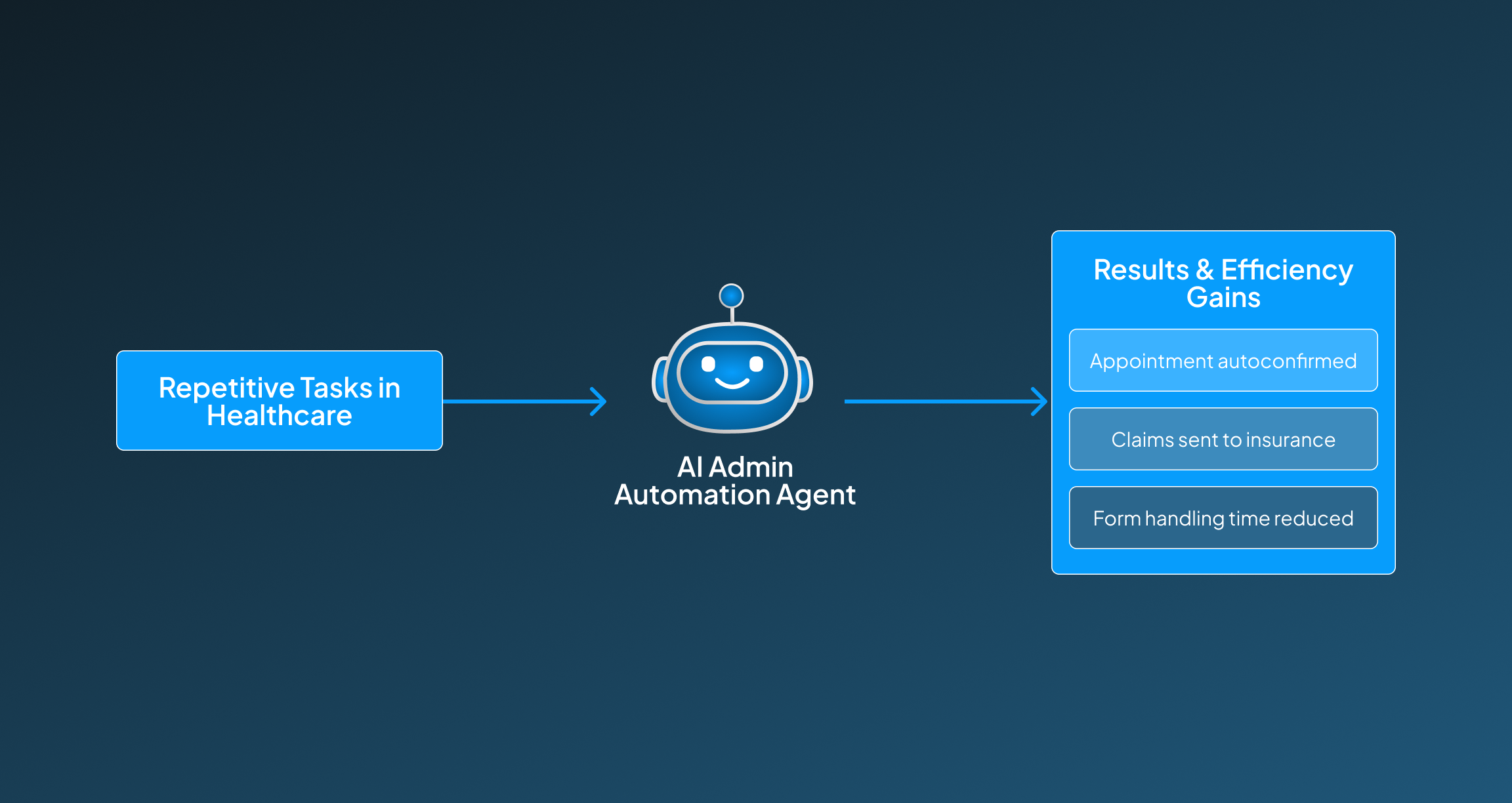
Predictive Analytics in Public Health
- Introduction: An application that could help in predicting public health events can help healthcare professionals plan for the arising diseases. AI agents can forecast public health events by analyzing data trends across populations.
- How It Works: AI agents for this healthcare application function by using the real-time data from hospitals, sensors, and historical records and predict disease outbreaks, healthcare surges, or regional health risks.
- Impact: An AI agent-driven application like this enables proactive outbreak prevention and planning, allowing improved vaccine distribution and hospital resource management, and informs public health policies with real-time insights
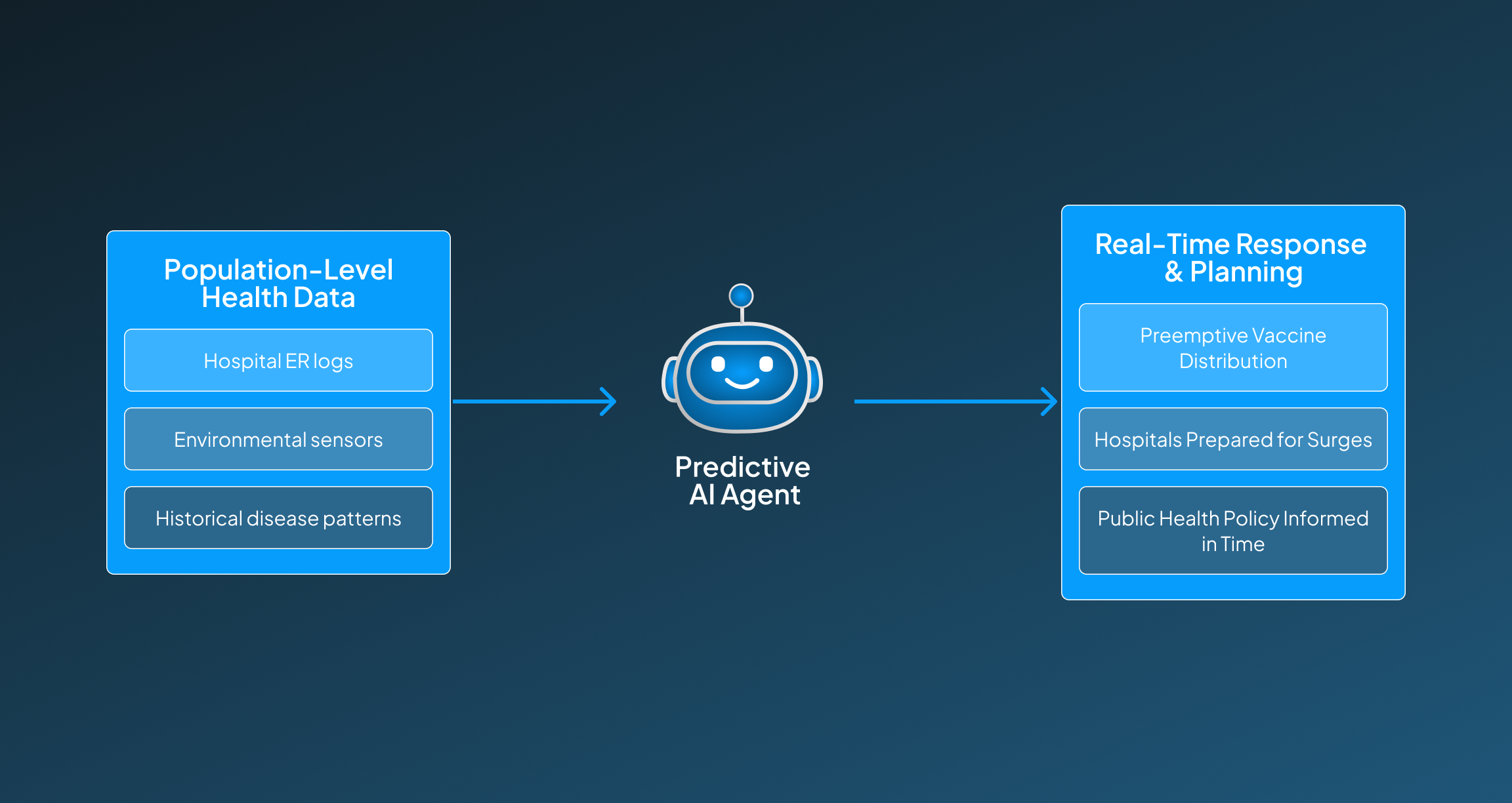
Benefits of AI Agents in Healthcare
Implementation of AI agents in healthcare applications has far-reaching benefits, as it not only enhances operational efficiency but also makes a significant contribution to extending more accurate and reliable healthcare assistance. For your understanding, we have listed down a few important benefits of AI agents in healthcare applications:
Enhanced Diagnostic Accuracy
AI agents hold the ability to analyze complex data such as medical images, lab results, and patient histories to support faster and more accurate diagnoses, which reduces errors and misinterpretations.
Faster Clinical Decision-Making
AI agents implemented for clinical decision-making purposes provide real-time insights and recommendations, helping clinicians make timely and intelligent, reason-based decisions during emergencies and complex scenarios.
Operational Efficiency and Cost Reduction
AI agents can automate administrative tasks like scheduling, billing, claims processing, and documentation, reducing overhead and allowing the hospital or healthcare staff to focus on high-value care.
Personalized and Precision Medicine
AI agents can assess patient-specific data (e.g., genetic, lifestyle, EHRs) that enables them to recommend treatments customized according to individual needs, improving outcomes and minimizing side effects that could be caused by particular drugs.
Continuous Remote Monitoring and Home Care
By connecting AI agents with wearables and IoT devices, they can monitor vitals in real time, detect anomalies, and alert caregivers or doctors accordingly if there are any critical changes, enabling more proactive care for the patients.
Predictive Analytics for Public Health
“A study highlights how AI-driven epidemiological surveillance can help in detecting and predicting disease outbreaks by analyzing data from electronic health records, social media, and news. This also showed that systems offer real-time trend analysis, enabling timely and effective public health responses. The research emphasized AI's edge over traditional methods, empowering early, proactive interventions and strengthening pandemic preparedness, reducing its widespread impact.” (Pranav et al., 2023)
Reduced Clinician Burnout
By performing repetitive clerical or decision-support tasks, these AI agents reduce workload, documentation time, and administrative stress, improving clinician satisfaction, alongside providing a more convenient support to the respective patients.
Accelerated Drug Discovery and Clinical Trials
“A recent study introduces the DO challenge benchmark, highlighting how AI agents, specifically those powered by LLMs, can help accelerate drug discovery by simulating virtual screening scenarios. The Deep Thought multi-agent system demonstrated strong potential, outperforming most human teams. Models like Claude 3.7 Sonnet and Gemini 2.5 Pro excelled in primary roles. Thus, AI agents streamline R&D to optimize clinical trials and design and patient selection.” (Khachik et al., 2025)
Improved Patient Engagement and Self-Care
These AI agents can set up intelligent reminders to provide 24/7 assistance. Also, these can answer your queries related to your health concerns whenever you need them, which promotes medication adherence and lifestyle changes.
Better Care Coordination and Data Integration
As AI agents integrate data across departments and systems, extending holistic patient views and much smoother collaboration among specialists, labs, and the care team, resulting in improved patient support.
Real-Time Analytics for Hospital Management
An AI agent can be used to provide dashboards and alerts on KPIs like ICU capacity, infection rates, or supply levels, helping administrators make faster and more intelligent decisions considering the available resources and infection rates.
Scalability in Underserved and Remote Areas
While AI agents are providing faster clinical decisions with enhanced accuracy, they can also deliver diagnostic and consultation support in areas lacking specialists, and perhaps access to the necessary healthcare. It bridges the gaps in care and improves accessibility for rural populations.
Limitations of AI Agents in Healthcare
Despite contributing a lot of benefits, these AI agents do hold some limitations, which might become a challenge for your application if it's not addressed and catered properly. So, for your help, we have mentioned some limitations so that you can plan your solution accordingly to avoid any inconvenience:
Data Privacy and Security Risks
These AI agents integrated for healthcare applications require access to sensitive health data, raising concerns around patient confidentiality (HIPAA/GDPR compliance), possible data breaches or unauthorized access, and unethical use of personal medical records.
Bias in AI Models
“The Studies revealed that AI algorithms trained on chest X-rays can underdiagnose diseases in underserved groups, especially Hispanic female patients. This raises concerns that a biased AI may worsen healthcare disparities by limiting equitable access to accurate diagnosis and treatment.” (Laleh et al., 2021)
Lack of Explainability
“Recent research has brought to notice the "black box" nature of AI models in healthcare holds challenges like a lack of transparency. This makes it difficult for healthcare providers to trust their decision. Therefore, it's of prime importance to develop explainable AI (XAI) techniques, which have enhanced understanding and can acquire trust of both doctors and patients.” (Rawan et al., 2023)
Regulatory and Legal Hurdles
It's extremely critical for the AI agents to meet the regulatory standards, but as the frameworks are still evolving, they might have AI-driven errors, delaying the approval process and its implementation.
Integration with Legacy Systems
Currently, most the hospital relies on outdated or siloed IT systems, which makes it difficult to deploy the AI solutions within the existing environment, without disrupting overall operations.
High Implementation and Maintenance Costs
Although implementing AI agents for healthcare applications helps in significantly reducing the cost spent on hiring more resources. But infrastructure upgrades, model training, customizations, and ongoing monitoring consume high implementation and maintenance costs.
Overdependence and De-skilling
Overdependence on these AI agents may result in reducing human oversight in essential decisions, which might cause a degradation in clinicians' diagnostic skills over a certain time, increasing risks if the system fails or starts giving incorrect responses.
Limited Generalizability Across Populations
If AI agents are trained on one region or demographic, then there is a high probability that they might not work efficiently in another due to different disease prevalence, variations in clinical practices, and inconsistent data formats and quality. This might be affecting the reliability of responses.
Ethical Concerns and Patient Consent
AI agents may raise issues around informed consent for AI-assisted decisions, ownership and use of patient data, and pose ethical dilemmas in end-of-life care or resource allocation of these applications.
Conclusion
AI agents are transforming healthcare applications by contributing smarter diagnostics, personalized treatment plans, predictive analytics, and streamlining administrative everyday workflows. It's not only assisting in early disease detection to accelerating drug discovery, and optimizing hospital operations, but its impact is both wide-reaching and deeply transformative.
With all these benefits, such as cost savings, improved accuracy, and enhanced patient engagement, its adoption still requires navigating challenges like data privacy, ethical concerns, and system integration. To fully exercise the power of AI in healthcare, these organizations must balance innovation with responsibility, ensuring human oversight and regulatory compliance. As these technologies continue to evolve, their role in reshaping patient care and operational efficiency will only grow stronger.
Is your organization ready to exercise the full potential of AI in healthcare? Book a personalized session with our experts at Centrox AI today and discover how tailored agentic solutions can elevate your clinical and operational strategy.

Muhammad Haris Bin Naeem
Muhammad Harris Bin Naeem, CEO and Co-Founder of Centrox AI, is a visionary in AI and ML. With over 30+ scalable solutions he combines technical expertise and user-centric design to deliver impactful, innovative AI-driven advancements.
Do you have an AI idea? Let's Discover the Possibilities Together. From Idea to Innovation; Bring Your AI solution to Life with Us!
Your AI Dream, Our Mission
Partner with Us to Bridge the Gap Between Innovation and Reality.
